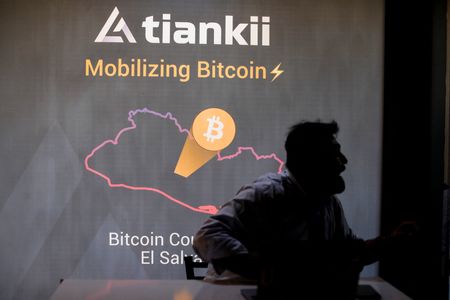By Nelson Renteria
SAN SALVADOR (Reuters) – El Salvador’s long-awaited bitcoin conference, which was in the limelight in 2021 after the small nation became the world’s first to adopt the cryptocurrency as legal tender, has lost its luster this time amid a deep rout in the digital currency universe.
The absence of big names from the bitcoin world and empty seats were noticeable at “Adopting Bitcoin: A Lightning Summit in El Salvador,” which began Tuesday and ends Thursday in the capital of San Salvador.
“The fact that prices are low, that there are problems elsewhere (…) causes an uncertain environment,” said Juan Fonseca, 41, a Guatemalan who traveled to the conference.
Like other cryptocurrencies, bitcoin fell sharply over the year as U.S. Federal Reserve interest rate hikes and ultra-high inflation prompted investors to ditch riskier assets.
Bitcoin, the world’s biggest and best-known cryptocurrency, has plummeted further following the spectacular collapse of crypto exchange FTX, now trading around $16,600, from an all-time high of nearly $69,000 in November last year.
Some enthusiasts see today’s problems as just a temporary blip.
Crypto exchange “Bitfinex will redouble its efforts to build a free, unstoppable, resilient and open bitcoin and technology infrastructure for El Salvador,” said Paolo Ardoino, the firm’s chief technology officer.
Ifinex, Bitfinex’s parent, has agreed to collaborate with El Salvador’s government to create a digital asset and securities regulatory framework.
“El Salvador will become the financial and tech center of Central America. The noise won’t distract the builders,” Ardoino added after meeting with El Salvador President Nayib Bukele.
Bukele, who championed the adoption of the cryptocurrency as legal tender alongside the U.S. dollar, said on Twitter on Wednesday night, “We are buying one Bitcoin every day starting tomorrow.”
So far, his government has acquired 2,381 bitcoins for about $107 million, according to private estimates.
(Reporting by Nelson Renteria, Writing by Carolina Pulice; Editing by Anthony Esposito and Richard Chang)


